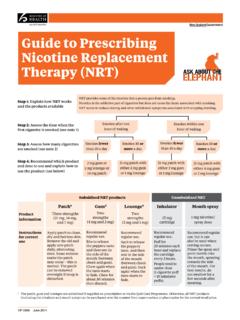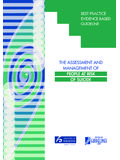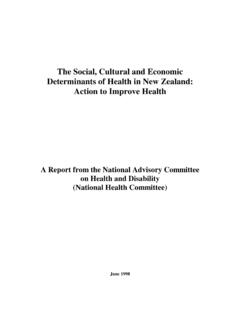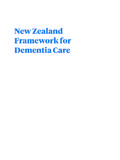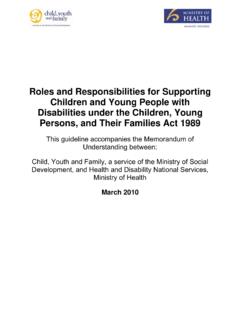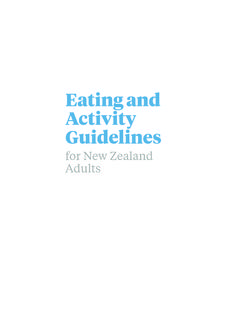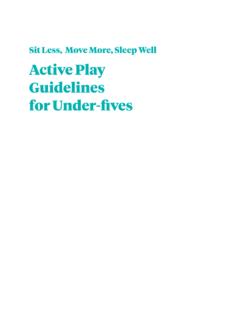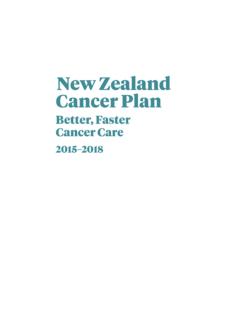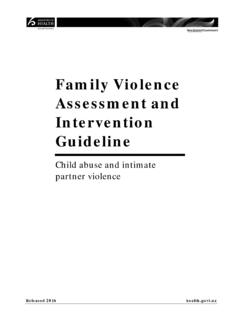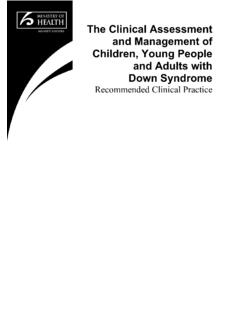Transcription of for Residential Aged Care - Ministry of Health
1 I Medicines Care Guides for Residential aged CareMedicines Care Guides for Residential aged Careii Medicines Care Guides for Residential aged CareCitation: Ministry of Health . 2011. Medicines Care Guides for Residential aged CareWellington: Ministry of in May 2011 by the Ministry of Health PO Box 5013, Wellington 6145, New ZealandISBN: 978-0-478-37438-4 (Print)ISBN: 978-0-478-37441-4 (Online)HP 5302 This document is available on the Ministry of Health 's website: Medicines Care Guides were produced as a collaborative initiative involving the Ministry of Health , The University of Auckland Freemasons Department of Geriatric Medicine, Waitemata District Health Board Gerontology Nursing Service, and the Residential aged Care Integration Programme Work Group.
2 The project team would like to thank the following clinicians, reviewers and leaders for their support, enthusiasm and District Health Board Gerontology Nursing ServiceProject Team Michal Boyd, NP, Project Lead; Tanya Bish, GNS, Project Co-ordinator; Denise Moffitt, Project Graphics; Anne James, Project Team Member; Jennifer Rowlands, Project Team Member; Janet Parker, NP, RACIP Leader; Ingrid Harvey, GNS; Hyeonjoo Lee, GNS; Hayley Moyle, Wound nurse Specialist; Marge Murphy, Wound nurse Specialist; Joan O Brien, GNS; Joy Owen, GNS; Carole Pilcher, GNS GNS = Gerontology nurse Specialist NP = nurse Practitioner RACIP = Residential aged Care Integration Programme Residential aged Care Integration Programme Work Group members Ma Theresa Araullo, Fritzie Bacolor, Bronwyn Barrow, Victoria Brown, Jessica Buddendyk, Raewyn Dunn, Charmaine Fowles, Claire Hatherell, Sue Jolly, Barbara Joy, Kathy McIlwain, Rebecca Marshall, Jessie Naicker, Sara Napier, Joanne Rama, Wendy Rhodes, Cindy Robertson, Carole Ropati, Barbara Sangster, Paula Siddle, Linda Venables, Minna Vuorinen, Cecily Walley, Connie Watts, Elizabeth Webb, Janene Whyte, Midge Williams, Laurel Winwood, Susan Young Medicines Care Guides reviewersRaewyn Apiti, Jenny Bindon, Katie Bolton, Helen Bowen, Sally Cole, Kaye Dennison.
3 Leslie Hawke, Jo Hikaka, Acenita Lim, Sue Lim, Angela McCallion, Ian McMichael, Emma McPhee, Heather McMaster, Sylvia Meijer, Bart Nuysink, Andrew Orange, Shankar Sankaran, John Scott, John Shaw, Michael Tatley, Maree Todd, Marilyn Tucker, Debz Tynan, Rik Walstra, Noeline Whitehead, Isabella WrightDHBNZ (Janice Donaldson), Pharmacy Guild of New Zealand (Annabel Young), Pharmaceutical Society (Euan Galloway), Provider Regulation ( Ministry of Health ), Safe Medication Management iii Medicines Care Guides for Residential aged CareContentsAcknowledgements ..iiIntroduction to the Medicines Care Guides for Residential aged Care ..1 Medicines Management ..2 Medicines Administration Competency ..4 Medicines Administration Safety ..5 Documentation, Incident Reporting and Quality Activities.
4 7 Adverse Medicine Reactions ..9 Adverse Medicine Reactions Contributing factors to adverse reactions ..10 Controlled Drugs ..11 Medicines Reconciliation ..12 Medicines Reconciliation Example ..13 Medicines Ordering Receiving, storing and returning ..14 Cytotoxic Medicines ..16 Residents Self-Medicating ..18 Residents Self-Medicating Facility leave/respite care ..19 Residents Self-Medicating Factors to considerTher ..20 Medicines Review ..21 STOPP Criteria (Galagher 2008) ..23 Strategies to Reduce the Use of Antipsychotic Medicines ..28 Medicines Effect Monitoring ..30 High-Risk Medicines Steroids, NSAIDS, digoxin, oral alendronate ..31 High-Risk Medicines Psychotropic medicines ..32 Warfarin ..34 Diabetes Medicines Tablets ..35 Diabetes Medicines Insulin.
5 37 Medicines via Subcutaneous, Intramuscular and Intravenous Routes ..39 Medicines via Intravenous and PICC Line Routes (IV-certified nurses only) ..40 Gentamicin ..41 Subcutaneous Fluids, Syringe Drivers and Enteral Tubes ..42 Decision-Making and Medicines at the End of Life ..43 Emergency Medicines and Equipment ..45 PRN Medicines, Standing Orders and Immunisations ..46 References and Resources ..48iv Medicines Care Guides for Residential aged Care1 Medicines Care Guides for Residential aged CareIntroduction to the Medicines Care Guides for Residential aged CareThe aim of the Medicines Care Guides is to provide a quick medicine management reference tool for all care staff working in Residential aged care in New Zealand. Guidance is provided for key medicine safety topics relevant to the care of older adults.
6 This guidance is based on current legislation, best available evidence and published guidelines, and is consistent with the New Zealand medicines strategy, Actioning Medicines New Zealand (Associate Minister of Health and Minister of Health 2010).The Medicines Care Guides are designed to support best practice in Residential aged care environments and do not replace sound clinical judgement, facility-specific policies and procedures, or current is envisaged that the Medicines Care Guides will be utilised by managers, registered nurses, enrolled nurses, Health care assistants, and other contracted Health professionals who work in Residential aged care facilities. Care environments include rest homes, dementia units, private hospitals, and psychogeriatric utilising these guides, it is important to be aware of the context and scope for which they were developed and consider other documents that guide the provision of services in New Zealand, such as the Health and Disability Service Standards Medicines Care Guides for Residential aged CareMedicines ManagementA comprehensive medicines management system is required in Residential aged care facilities to manage the safe and appropriate prescribing, dispensing, supply, administration, review, storage, disposal and reconciliation of medicines.
7 This system must comply with legislation, regulations and guidelines. Policies and procedures should be clearly documented and available to all staff at all times. Staff involved in medicines management are required to work within their scope of practice and demonstrate their competence to provide this service. Access to specialist medicines education and advice for residents and staff must be made available The clinical file should include documentation that records all relevant details to support safe medicines management and should comply with legislation, regulations, standards and guidelines. The safety of residents, visitors, staff and contractors must be maintained through appropriate storage and access to team involvementThe multidisciplinary team can include but is not limited to the following:Resident/Representative The resident or their representative is included in the multidisciplinary team and agrees to and is kept informed of medicine-related aspects of their Contracts services of Health professionals (eg, pharmacists; general practitioners, nurse practitioners, registered nurses.)
8 Dieticians, etc) to support safe, resident focused medicines management Ensures there are sufficient appropriately qualified staff to meet the needs of the residents Ensures there are appropriate quality and risk management activities to support safe medicines Medical or nurse practitioner Maintains current evidence-based knowledge of medicines relevant to the care of older adults Provides timely, legible, accurate and legal medicine prescriptions that meet the individual needs of the residents Considers non-pharmaceutical alternatives Liaises with the pharmacist and facility staff regarding medicine prescriptions as necessary Liaises with the multidisciplinary team to ensure appropriate ongoing care to residents Provides advice and direction to staff regarding medicines administration, monitoring and management Documents, diagnoses and treatment rationale in the clinical file Participates in medicines reconciliation for residents Participates in multidisciplinary medicine reviews Is actively involved in quality and risk management activities related to safe medicines management.
9 Including review of policy and procedures Provides learning opportunities for staff related to resident diagnoses and medicines Medicines Care Guides for Residential aged CareDispensing Pharmacist Maintains current evidence-based knowledge of medicines relevant to the care of older adults Accurately dispenses and labels medicines according to prescriptions, legislation, regulations and guidelines Liaises with the prescriber regarding medicine prescriptions as necessary Ensures timely supply/delivery of medicines ordered for residents to ensure appropriate ongoing care Provides advice and information regarding medicines and safe medicine management processes Ensures continuity of medicine supply for residents transferring in/out of the facility Participates in medicines reconciliation for residents Is actively involved in quality and risk management activities related to safe medicines management, including review of policy and procedures Conducts onsite medicine stocktakes Ensures safe and timely removal of expired, unused.
10 Damaged medicines Provides staff training regarding medicines and safe management registered nurse Maintains current evidence-based knowledge relevant to the care of older adults Assesses and identifies possible individual risk factors related to medicines Monitors changes in Health status and responds accordingly Identifies signs and symptoms indicating adverse medicine reactions Liaises with the manager and the multidisciplinary team to provide services that meet the needs of the resident Participates in multidisciplinary medicine reviews Provides direction and/or supervision for unregulated staff as required Documents information regarding medicines and their effects on the resident in the clinical file Contacts the prescriber regarding changes in Health status where necessary Participates in medicines reconciliation for residents Participates in multidisciplinary medicine reviews Is actively involved in quality and risk management activities related to safe medicines management, including review of policy and procedures Provides learning opportunities for Management (Continued)4 Medicines Care Guides for Residential aged CareMedicines Administration CompetencyBefore giving medicines, all staff must demonstrate that they have knowledge, understanding and practical abilities to be considered as competent.
